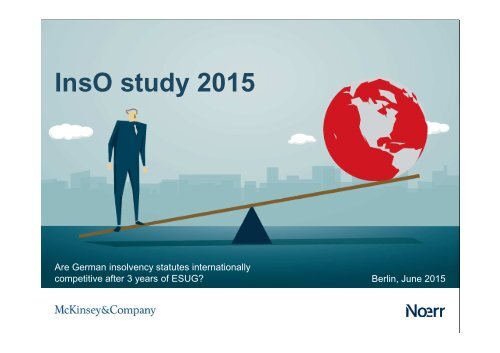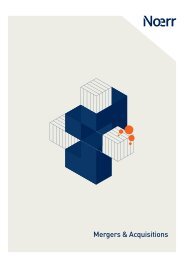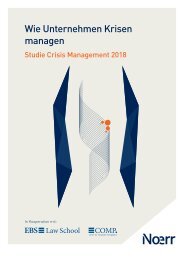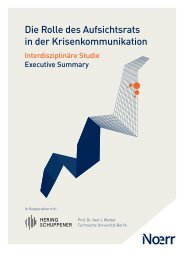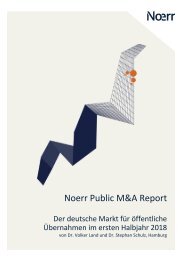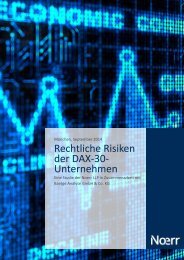InsO study 2015
You also want an ePaper? Increase the reach of your titles
YUMPU automatically turns print PDFs into web optimized ePapers that Google loves.
<strong>InsO</strong> <strong>study</strong> <strong>2015</strong><br />
Are German insolvency statutes internationally<br />
competitive after 3 years of ESUG?<br />
Berlin, June <strong>2015</strong>
The <strong>2015</strong> McKinsey/Noerr <strong>InsO</strong> <strong>study</strong> explores the international<br />
competitiveness of German insolvency law after 3 years of ESUG<br />
ESUG (March 2012)<br />
3 years later<br />
ESUG OBJECTIVES<br />
• Strengthen the competitiveness of<br />
German insolvency law<br />
• Stop German companies attempting to<br />
restructure under UK law<br />
KEY CHANGES<br />
• Strengthen influence of creditors<br />
• Simplify self-administration<br />
• Eliminate obstacles and delays to the<br />
insolvency plan proceedings<br />
ESUG ANALYSIS<br />
• Legislators are not due to assess<br />
ESUG until 5 years have passed<br />
• Preliminary <strong>study</strong> with interim<br />
findings after 3 years<br />
• Focus on competitiveness in an<br />
international context<br />
• To this end, a survey was conducted in<br />
March <strong>2015</strong> of around 220<br />
restructuring and insolvency experts<br />
• More than 2/3 of respondents already<br />
have some experience with other legal<br />
systems<br />
SOURCE: Noerr; McKinsey<br />
2
Delivering high creditor satisfaction is still seen as the most important<br />
objective of a restructuring<br />
How would you describe a successful restructuring?<br />
Percent<br />
Other<br />
Retain jobs<br />
Preserve legal<br />
entity<br />
3 0 0<br />
15<br />
25<br />
21<br />
62<br />
6<br />
0 0<br />
6 5 8<br />
6 15 9<br />
24<br />
28<br />
35<br />
20<br />
Ensure high<br />
creditor<br />
satisfaction<br />
61<br />
0<br />
38<br />
69<br />
88<br />
50<br />
58<br />
48<br />
Total<br />
Judge<br />
Insolvency<br />
administrator<br />
Commercial<br />
bank<br />
Other<br />
creditor<br />
Consultant/<br />
lawyer<br />
Other<br />
SOURCE: Noerr; McKinsey<br />
3
German insolvency law is internationally competitive; however,<br />
respondents from other countries see US and UK law as more competitive<br />
Which insolvency law do you think is the most attractive when it comes to restructuring?<br />
Percent<br />
All respondents<br />
Well-informed 1<br />
International respondents<br />
German law<br />
39<br />
33<br />
6<br />
UK law<br />
29<br />
36<br />
32<br />
US law<br />
26<br />
24<br />
42<br />
Spanish law<br />
1<br />
2<br />
3<br />
Dutch law 1<br />
1<br />
0<br />
Other<br />
4<br />
4<br />
16<br />
"I believe that ESUG has made German insolvency law more competitive. If you want to<br />
restructure operationally as well as financially, I think the <strong>InsO</strong> self-administration/protective shield<br />
procedure is actually more suitable than a SOA under UK law."<br />
– German commercial bank<br />
"If we had a pre-insolvency restructuring procedure then Germany would also be a competitive<br />
location for restructuring."<br />
– Anglo-Saxon distressed investor<br />
1 Participants responded positively to the question: I feel that I have sufficient information about the options available to me in other legal systems<br />
SOURCE: Noerr; McKinsey<br />
4
Changes to ESUG have made German restructuring law more attractive –<br />
broad agreement in all groups surveyed<br />
Changes to ESUG have made German restructuring law more attractive<br />
Percent<br />
The high level of agreement ...<br />
... continues across all groups<br />
Completely agree<br />
30<br />
Yes<br />
No<br />
Mostly agree<br />
Slightly agree<br />
26<br />
36<br />
92<br />
Judge<br />
Insolvency<br />
administrator<br />
Commercial bank<br />
86<br />
88<br />
87<br />
14<br />
12<br />
13<br />
Slightly disagree<br />
6<br />
Other creditor<br />
89<br />
11<br />
Mostly disagree<br />
1<br />
Consultant/lawyer<br />
95<br />
5<br />
Completely disagree<br />
1<br />
Other<br />
100<br />
"Even though ESUG still has a few wrinkles to iron out, it is so much better than what we had<br />
before in Germany."<br />
– Anglo-Saxon distressed investor<br />
SOURCE: Noerr; McKinsey<br />
5
Planning security is the key criterion in selecting a jurisdiction – this<br />
criterion is largely met under post-ESUG German law<br />
Criterion met Criterion partly met Criterion not met<br />
Criteria<br />
For you, what are the key criteria in<br />
choosing a specific jurisdiction for<br />
insolvency proceedings?<br />
Percent<br />
What conditions are met under<br />
German insolvency law (post-<br />
ESUG)?<br />
Percent<br />
High level of planning security<br />
Proceedings do not take much time<br />
Debtor's ability to exert influence<br />
Limitation to specific groups of creditors<br />
Low risk of abuse<br />
Minimal access requirements<br />
Low procedural costs<br />
37<br />
17<br />
14<br />
11<br />
8<br />
7<br />
5<br />
27<br />
12<br />
20<br />
6<br />
12<br />
17<br />
6<br />
"ESUG now delivers greater planning reliability under German law for business owners, managers, and<br />
consultants while simultaneously retaining the competitive advantage of insolvency payments."<br />
– Insolvency administrator<br />
SOURCE: Noerr; McKinsey<br />
6
Criteria that can be regulated by law are met under ESUG –<br />
lack of management competency seen as most critical risk<br />
Criterion met Criterion partly met Criterion not met<br />
Criteria<br />
What do you believe are the<br />
most important factors in a<br />
successful self-administered<br />
restructuring?<br />
Percent<br />
Which criteria do you are met under<br />
German insolvency law (post-ESUG)?<br />
Percent<br />
Competent management team<br />
(know-how, use of CRO)<br />
Cooperation between self-administrators<br />
and administrators<br />
Collaboration with a competent<br />
preliminary creditor committee<br />
Planning security<br />
13<br />
14<br />
19<br />
22<br />
7<br />
13<br />
14<br />
14<br />
Early application<br />
10<br />
11<br />
Alignment with insolvency legislation<br />
8<br />
10<br />
Fast completion of proceedings<br />
6<br />
6<br />
Independence of custodian<br />
4<br />
10<br />
Debtor's right to appoint<br />
the preliminary custodian<br />
4<br />
14<br />
SOURCE: Noerr; McKinsey<br />
7
Around 1/3 of self-administration proceedings are converted to standard<br />
insolvency proceedings as they progress<br />
Regarding all applications<br />
for self-administration<br />
Percent<br />
Application<br />
Where<br />
preliminary<br />
proceedings are<br />
ordered<br />
At initiation<br />
After initiation<br />
Application for self-administration<br />
submitted<br />
Preliminary insolvency administration<br />
ordered<br />
Preliminary self-administration<br />
ordered<br />
Launched as standard insolvency<br />
proceedings<br />
Launched as self-administration<br />
proceedings<br />
Converted to standard insolvency<br />
after initiation<br />
Self-administration proceedings<br />
lifted or still ongoing<br />
867<br />
126<br />
741<br />
85<br />
656<br />
74<br />
582 -33%<br />
14.5<br />
9.8<br />
8.5<br />
Insolvency proceedings lifted<br />
Self-administration proceedings still<br />
ongoing (or data not known)<br />
194<br />
388<br />
Database 03/2012 - 04/<strong>2015</strong>, adjusted to exclude proceedings for the following legal forms: e.V., gGmbH, individuals<br />
SOURCE: WBDat/Verlag INDat, Cologne<br />
8
However, the improvements made have increased complexity and led to<br />
increased consulting effort ...<br />
ESUG has made restructuring more complex and has led to increased<br />
consulting effort<br />
Percent<br />
Completely agree 9<br />
Mostly agree<br />
35<br />
80<br />
Slightly agree 36<br />
Slightly disagree<br />
14<br />
Completely disagree<br />
5<br />
20<br />
Mostly disagree<br />
1<br />
"The [...] protective shield and plan proceedings in particular are too complex."<br />
– University professor<br />
SOURCE: Noerr; McKinsey<br />
9
... which is also reflected in the higher cost of restructuring<br />
Restructuring under the protective shield and subsequent insolvency proceedings<br />
costs more than restructuring in plan proceedings (before changes)<br />
Percent<br />
Completely agree 8<br />
Mostly agree 20<br />
63<br />
Slightly agree 35<br />
Slightly disagree 25<br />
Mostly disagree<br />
7<br />
37<br />
Completely disagree<br />
4<br />
"Debtors are not usually able to initiate successful self-administration proceedings without external<br />
consulting [...]."<br />
– Insolvency judge<br />
"For smaller companies especially there are significant obstacles: the cost of consulting is typically<br />
at least EUR 200,000[...]."<br />
– Lawyer<br />
SOURCE: Noerr; McKinsey<br />
10
Protective shield and subsequent insolvency proceedings usually take<br />
7 to 12 months to complete<br />
How long, in your experience, does<br />
restructuring take with the protective<br />
shield and subsequent insolvency<br />
proceedings?<br />
Percent<br />
Assessment of time between<br />
application and end of<br />
proceedings<br />
March 2012 to April <strong>2015</strong><br />
Percent<br />
1 - 6 months<br />
10<br />
24<br />
7 - 12 months<br />
70<br />
55<br />
13 - 28 months<br />
20<br />
21<br />
2/3 of respondents stated that restructuring with the protective shield and<br />
subsequent insolvency proceedings is relatively fast<br />
SOURCE: WBDat/Verlag INDat, Cologne<br />
11
The options available for creditors to assert influence are considered<br />
positive following the introduction of ESUG<br />
Agreement<br />
Percent<br />
Shareholder<br />
rights<br />
I<br />
The modification of shareholders' rights outlined in the<br />
insolvency plan (e.g., debt equity swap) does not<br />
seriously disadvantage shareholders<br />
81<br />
The option to become involved in the creditor<br />
committee increases creditors' willingness to<br />
support restructuring<br />
II 83<br />
Creditor<br />
involvement<br />
III<br />
IV<br />
Creditor committees are becoming increasingly<br />
professional<br />
82<br />
The rights of the preliminary creditor committee<br />
should be expanded<br />
62<br />
"As of now, the insolvency law has relinquished all moderation under company<br />
law."<br />
– Insolvency administrator<br />
SOURCE: Noerr; McKinsey<br />
12
I<br />
The modification of shareholders' rights outlined in the<br />
insolvency plan is appropriate<br />
BACKUP<br />
The modification of shareholders' rights<br />
outlined in the insolvency plan (e.g., debt<br />
equity swap) is too much of a disadvantage<br />
to shareholders<br />
Percent<br />
Comments<br />
Completely<br />
agree<br />
Mostly<br />
agree<br />
Slightly agree 11<br />
Slightly<br />
disagree<br />
3<br />
5<br />
23<br />
• Debt equity swap is an established<br />
restructuring instrument in US and UK<br />
• Initiating a debt equity swap is now<br />
easier in Germany thanks to ESUG<br />
(prohibition to obstruct §245 <strong>InsO</strong> and<br />
liability for difference §254 para. 4 <strong>InsO</strong>)<br />
• Debt equity swap has been<br />
implemented in several prominent<br />
proceedings<br />
Mostly<br />
disagree<br />
31<br />
81<br />
Completely<br />
disagree<br />
27<br />
SOURCE: Noerr; McKinsey<br />
13
II<br />
The option to become involved in the creditor committee<br />
increases creditors' willingness to support restructuring<br />
BACKUP<br />
The option to become involved in the creditor committee increases<br />
creditors' willingness to support restructuring<br />
Percent<br />
Completely agree<br />
8<br />
Mostly agree<br />
29<br />
83<br />
Slightly agree<br />
46<br />
Slightly disagree<br />
11<br />
Mostly disagree<br />
5<br />
17<br />
Completely disagree<br />
1<br />
SOURCE: Noerr; McKinsey<br />
14
III/IV<br />
Creditor committees are becoming increasingly professional –<br />
the rights of the preliminary creditor committee should be expanded<br />
BACKUP<br />
Creditor committees are<br />
becoming increasingly<br />
professional<br />
Percent<br />
The rights of the preliminary creditor<br />
committee should be expanded<br />
Percent<br />
Agree<br />
82<br />
62<br />
Disagree<br />
18<br />
38<br />
"Our practical experience of being involved in (preliminary) creditor committees has been<br />
generally positive."<br />
– German commercial bank<br />
"We do not usually participate in the creditor committee."<br />
– German commercial bank<br />
SOURCE: Noerr; McKinsey<br />
15
Even post-ESUG there are myriad reasons for restructuring under<br />
international law – analysis based on individual cases<br />
Restructuring should be carried out under foreign law if ...<br />
Percent<br />
… it is important to rapidly conclude proceedings to ensure the<br />
restructuring succeeds<br />
22<br />
… the restructuring can be realized by restructuring<br />
the main credit agreement<br />
20<br />
… this contract is subject to foreign law<br />
17<br />
… the main creditors come from an international<br />
legal system<br />
16<br />
… the entity in question is a Group/corporation in which<br />
more than one company needs to be restructured<br />
14<br />
… the indirect insolvency costs in Germany<br />
are expected to be high (e.g., loss of image/revenue)<br />
10<br />
In practice, the limitation to individual groups of<br />
creditors was an especially important argument<br />
SOURCE: Noerr; McKinsey<br />
16
Respondents identified 4 main disadvantages of German insolvency law<br />
compared to other legal systems<br />
Are the following characteristics of German insolvency law perceived as disadvantages?<br />
Percent<br />
Tend to agree<br />
Tend to disagree<br />
1<br />
No Group insolvency law<br />
71<br />
29<br />
2<br />
German claw-back law<br />
70<br />
30<br />
3<br />
4<br />
No pre-insolvency<br />
restructuring procedure<br />
No limitation to<br />
specific groups of creditors<br />
54<br />
64<br />
For judges and insolvency administrators, the disadvantages of<br />
German insolvency law tend to carry less weight<br />
46<br />
36<br />
"Unfortunately, you still have to file for insolvency in Germany – ESUG has not changed that – even<br />
though a pre-insolvency restructuring procedure is long overdue."<br />
– Anglo-Saxon distressed investor<br />
"It's bad that Germany has no viable Group insolvency law, and sadly the current drafts do not bode<br />
well – cooperation is all well and good but is often barely justiciable."<br />
– Anglo-Saxon distressed investor<br />
SOURCE: Noerr; McKinsey<br />
17
International respondents are extremely interested in having English as an<br />
additional language of the court<br />
BACKUP<br />
English should be introduced as an additional language of the court<br />
for insolvency proceedings where the majority of creditors are<br />
international<br />
Percent<br />
Tend to agree<br />
Tend to disagree<br />
Total<br />
47<br />
53<br />
Germany<br />
41<br />
59<br />
International<br />
84<br />
16<br />
SOURCE: Noerr; McKinsey<br />
18
Conclusion and outlook<br />
• Germany's insolvency law is mostly seen as positive after 3 years of ESUG<br />
– international respondents still recognize shortcomings compared<br />
to US and UK law<br />
• Disadvantage: restructuring against the wishes of individual creditors is<br />
only possible in comprehensive insolvency proceedings that cover all of<br />
the debtor's business relationships<br />
• A (pre-insolvency) restructuring procedure with the option of<br />
restructuring with only a limited group of creditors would be a major step<br />
toward improving the competitiveness of Germany as a restructuring location<br />
• The number of company insolvencies has fallen year on year since 2010 –<br />
litmus test of a major wave of bankruptcies is yet to be carried out.<br />
"Flight risk" for proceedings being conducted abroad has not yet been<br />
eliminated, especially not for large-scale and complex proceedings focusing<br />
on financial restructuring<br />
SOURCE: Noerr; McKinsey<br />
19
We look forward to this discussion with you!<br />
Dr. Thomas<br />
Hoffmann<br />
Dr. Andrea<br />
Braun<br />
Klaus<br />
Kremers<br />
Daniel<br />
Himmel<br />
Dr. Johannes<br />
Klein<br />
Michael<br />
Becker<br />
Lea<br />
Weinekötter<br />
Partner, Co-Head<br />
Restructuring &<br />
Insolvency<br />
Graduate research<br />
assistant/ legal<br />
trainee<br />
Partner, Recovery<br />
and Transformation<br />
Services<br />
Junior partner,<br />
Recovery and<br />
Transformation<br />
Services<br />
Junior partner,<br />
Recovery and<br />
Transformation<br />
Services<br />
Engagement<br />
manager, Recovery<br />
and Transformation<br />
Services<br />
Senior associate<br />
thomas.hoffmann<br />
@noerr.de<br />
andrea.braun<br />
@noerr.de<br />
klaus_kremers<br />
@mckinsey.com<br />
daniel_himmel<br />
@mckinsey.com<br />
johannes_klein<br />
@mckinsey.com<br />
michael_becker<br />
@mckinsey.com<br />
lea_weinekoetter<br />
@mckinsey.com<br />
Noerr is one of the top European law firms with more than 500 professionals in Germany, Europe and the USA. Its Restructuring & Insolvency practice<br />
area comprises more than 50 professionals. Noerr's comprehensive legal services in this field are supported by the business-oriented Noerr Consulting as<br />
well as Team Treuhand GmbH when it comes to tackling specialized tasks, such as representing bond holders and assuming the position of restructuring<br />
shareholders<br />
McKinsey & Company is the leading global management consulting firm comprising more than 9,000 consultants, of which 1,300 consultants are based in<br />
Germany. McKinsey established the Recovery & Transformation Services (RTS) unit in 2010 to focus exclusively on holistic transformations and<br />
restructuring efforts. We call on professionals in industry, private equity, and restructuring and blend their restructuring experience with the global network<br />
of industry and functional experts in our firm. We work hand-in-hand with our clients: we advise, drive change processes in management and the front line,<br />
negotiate with stakeholders, and secure implementation<br />
20


